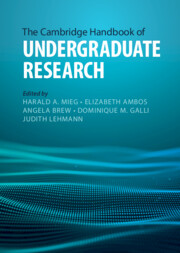Book contents
- The Cambridge Handbook of Undergraduate Research
- The Cambridge Handbook of Undergraduate Research
- Copyright page
- Contents
- Figures
- Tables
- Contributors
- Foreword
- Foreword
- 1 Introduction
- Part I Theory and Research on Undergraduate Research
- Part II Implementation, Approaches, Methods
- Part III Disciplines
- 17 Introduction
- Part III.1 STEM
- 18 Undergraduate Research in Physics
- 19 Undergraduate Research in Chemistry
- 20 Undergraduate Research in Biology
- 21 Undergraduate Research in Mathematics
- 22 Undergraduate Research in Engineering
- 23 Undergraduate Research in Data Science
- Part III.2 Health
- Part III.3 Social Sciences
- Part III.4 Humanities
- Part III.5 Arts & Design
- Part III.6 Disciplines A–Z
- Part IV International Perspective
- Part V Avenues for Developing Undergraduate Research
- Index
- References
22 - Undergraduate Research in Engineering
from Part III.1 - STEM
Published online by Cambridge University Press: 11 August 2022
- The Cambridge Handbook of Undergraduate Research
- The Cambridge Handbook of Undergraduate Research
- Copyright page
- Contents
- Figures
- Tables
- Contributors
- Foreword
- Foreword
- 1 Introduction
- Part I Theory and Research on Undergraduate Research
- Part II Implementation, Approaches, Methods
- Part III Disciplines
- 17 Introduction
- Part III.1 STEM
- 18 Undergraduate Research in Physics
- 19 Undergraduate Research in Chemistry
- 20 Undergraduate Research in Biology
- 21 Undergraduate Research in Mathematics
- 22 Undergraduate Research in Engineering
- 23 Undergraduate Research in Data Science
- Part III.2 Health
- Part III.3 Social Sciences
- Part III.4 Humanities
- Part III.5 Arts & Design
- Part III.6 Disciplines A–Z
- Part IV International Perspective
- Part V Avenues for Developing Undergraduate Research
- Index
- References
Summary
Research opportunities for undergraduate engineers vary widely in topics, tasks, and organization, yet they all convey knowledge and practices that are fundamental to engineering work and culture. This chapter outlines that engineering worldview and how it shapes undergraduate research opportunities, and then recommends best practices for undergraduate research in engineering.
Keywords
- Type
- Chapter
- Information
- The Cambridge Handbook of Undergraduate Research , pp. 222 - 229Publisher: Cambridge University PressPrint publication year: 2022

